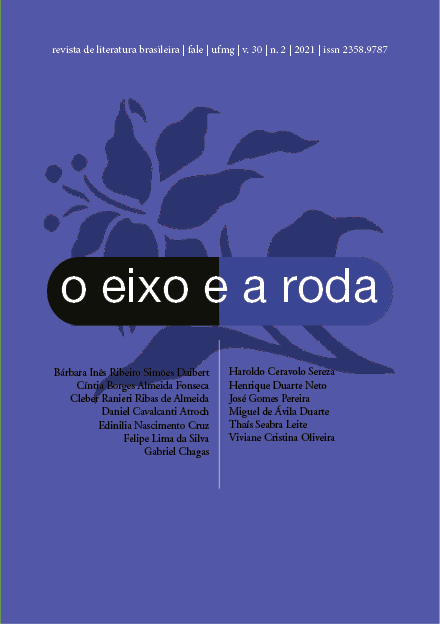The sad end of Clarice Lispector or The passion according to Lima Barreto: the precarious language of Macabéa and Clara dos Anjos
DOI:
https://doi.org/10.17851/2358-9787.30.2.194-208Keywords:
Lima Barreto, Clarice Lispector, Brazilian literature, comparative literature, postcolonial theoryAbstract
This article aims to create a comparative reading between the novels Clara dos Anjos, by Lima Barreto, and A hora da estrela, by Clarice Lispector. Therefore, the attempt to develop an own language will be the converging theme between the narratives, based on the fictional experiences of the protagonists. As a theoretical approach, the investigation starts from a bibliographic research that runs through the post-colonial tradition, here indicated by the writings of the philosopher Achille Mbembe, the theorist Gayatri Spivak and the psychiatrist Frantz Fanon. This approach also requires the notion of framing proposed by the American philosopher Judith Butler, whose ideas allow a better discussion around the non-hegemonic aspect of bodies, an essential reading key for the characters studied in this work. Thus, based on the comparative method of analysis, the article demonstrates the extent to which the precariousness of language can be used as a tool in reading these two novels. It proposes an interpretative possibility for the two works from a contemporary perspective, based on the social markers of difference and the formation of colonial societies. Keywords: Lima Barreto; Clarice Lispector; Brazilian literature; comparative literature, postcolonial theory.
Downloads
References
BARRETO, L. Clara dos Anjos. São Paulo: Penguin Classics Companhia das Letras, 2012.
BERMAN, M. Tudo que é sólido desmancha no ar: a aventura da modernidade. Tradução: Carlos Felipe Moisés e Ana Maria L. Ioriatti. São Paulo: Companhia das Letras, 2007.
BUTLER, J. Quadros de guerra: quando a vida é passível de luto? Tradução: Sérgio Tadeu de Niemeyer Lamarão e Arnaldo Marques da Cunha. Rio de Janeiro: Civilização Brasileira, 2017.
FANON, F. Pele negra, máscaras brancas. Tradução: Renato da Silveira. Salvador: EDUFBA, 2008.
FIGUEIREDO, M. No corpo, na casa e na cidade: as moradas da ficção. Rio de Janeiro: Língua Geral, 2011.
LISPECTOR, C. A hora da estrela. Rio de Janeiro: Rocco, 1998.
MBEMBE, A. Crítica da razão negra. Tradução: Marta Lança. Lisboa: Antígona, 2014.
NASCIMENTO, A. O genocídio do negro brasileiro: processo de um racismo mascarado. São Paulo: Perspectivas, 2016.
NUNES, B. A Paixão de Clarice Lispector. In: NOVAES, A. (Org.). Os sentidos da paixão. São Paulo: FUNARTE, Companhia das Letras, 2009. p. 307-321.
QUEIRÓS, E. O primo Basílio. Rio de Janeiro: Nova Fronteira, 2011.
SCHWARCZ, L. Lima Barreto: triste visionário. São Paulo: Companhia das Letras, 2017.
SCHWARCZ, L. Sobre o autoritarismo brasileiro. São Paulo: Companhia das Letras, 2019.
SPIVAK, G. Pode o subalterno falar? Tradução: Sandra Regina Goulart Almeida, Marcos Pereira Feitosa, André Pereira Feitosa. Belo Horizonte: Editora UFMG, 2010.




 Esta obra está licenciada com uma Licença
Esta obra está licenciada com uma Licença 